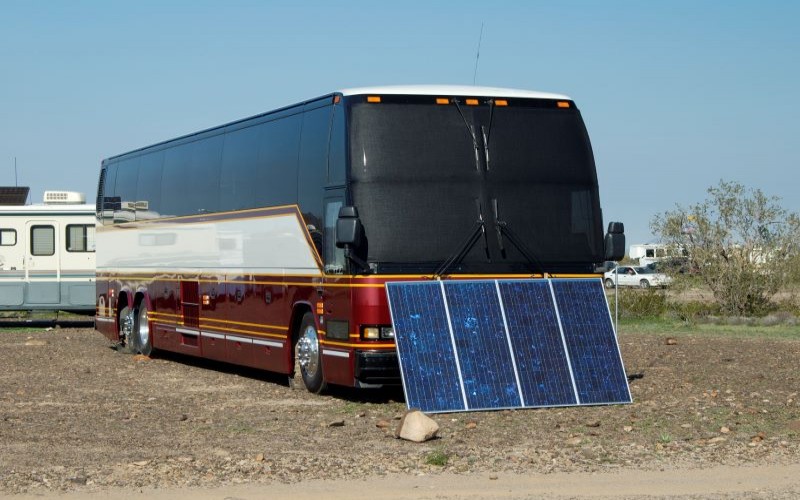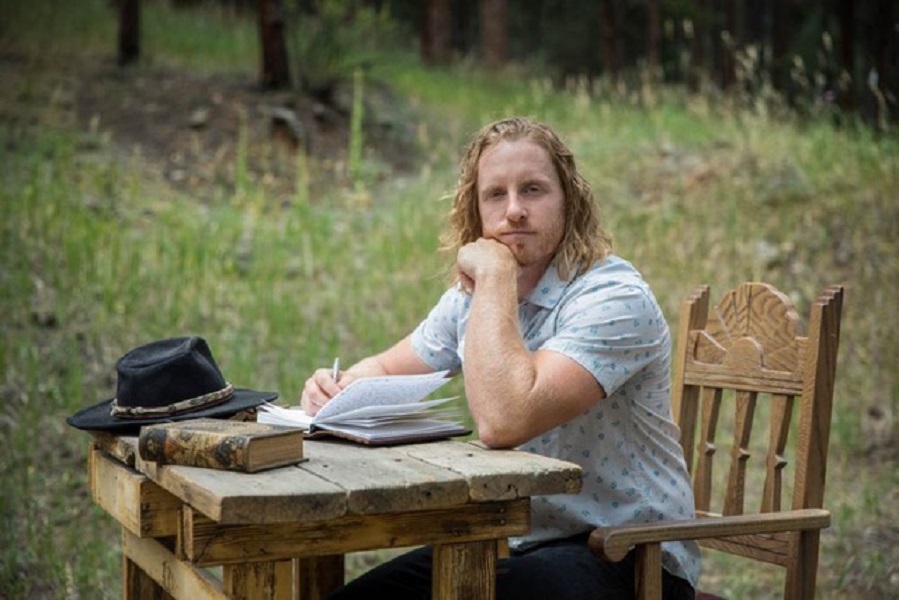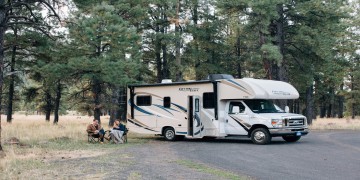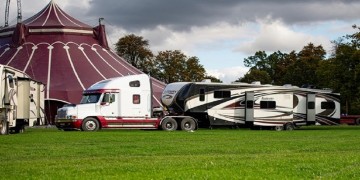Name of Blog
RV Tips Blog
Camping Tips Blog

Basics of Solar Power for RVs
01-24-2020Solar Power for RVs is just one of many different innovations and developments that have driven modern RVing into its current age. These days, RVs really can be fully-functional homes on wheels that are equipped with every modern necessity and essential that you could imagine. From the basic to the ridiculous and everything in between, you can equip your rig with just about anything. Some of these additions are meant to increase comfort and a feeling of home while others can be considered essentials.
While you don’t have to have any of these modern niceties to enjoy your RV experience, one of these innovations that I would recommend to every RVer is to utilize solar power. By harnessing the power of the sun during your RV travels, you can keep your batteries charged up and your lights on without having to worry about running a generator or using fuel. It might not always be an option on cloudy days, but your RV has plenty of space on its roof and dashboard for at least a few solar panels, if not a full array. Here is a look at some of the basics of solar power for your RV.
Basic Solar Power Setup for an RV
In order to use solar power on your RV, you need to have the right equipment to be set up to utilize the power of the sun. Any solar setup has some basic components that allow it to operate and take UV rays, store them, and convert them into usable power. To accomplish this, you need both a system to charge batteries as well as a way to take the power stored in these batteries and run them to any electrical appliance you wish to use. So, for a solar system on your RV, you need to have solar panels, a power inverter, and a charge controller.
The solar panels and charge controller are going to work to take the energy created by sunlight and send that to your batteries for storage. The power inverter will take the energy stored in the batteries and send it to any and all appliances you want to use. Those are the basics to a solar setup on your RV. With those three elements, you can begin to use solar power in a very easy and efficient way. The differences in setup come down to how much power you need or want and how much you can afford or want to spend on your solar system (pun intended…).
Related Read: Solar Power in your RV (part 1)
How Solar Power Charges Your Batteries
Many RVs come equipped with some sort of solar power straight out of the dealership. If yours does not have one, you can easily get this installed. You’ll either already have or will get set up with the three main elements needed for solar power, as mentioned above. The solar panels installed on the roof of your RV will gather the energy created by sunlight and funnel it down towards your batteries. If you’ve ever been on your RVs roof on a really hot day, you can easily see how much power is possible up there but you might also be wondering if it’s possible to have too much. The quick answer to this is that yes, your batteries can be overwhelmed with energy generated from the solar panels if left unregulated. But that’s where the charge controller comes into play.
The charge controller serves as a middle point between the solar panels and the batteries and keeps an eye on how much of a charge the batteries can handle. The controller will only allow a certain amount of energy through depending on how much of a charge the batteries need. This is crucial as it keeps your batteries in good working order and creates an automatic system that doesn’t require your constant attention. At first light in the morning after using power all night, your batteries will be pretty low and can handle a lot of power. The charge controller will let in a bunch of energy and as the day goes on and the batteries start to fill up, the controller will start to limit the amount of charge let in.
Related Read: Solar Power for the RV
How a Power Inverter Works
The other element to your RVs solar setup is the power inverter that takes the energy stored in your batteries and translates that towards anything electrical you wish to operate. The power inverter converts the power from your batteries to a variety of electrical current that can be used by your appliances. You might not be familiar with basic electronics but there are two common types of electrical current, alternating or direct. These are also known as AC or DC power. A power inverter takes the DC power stored in your batteries and turns them into AC power that can be used by anything plugged into an outlet and other common things such as lights. The exact way this works is a bit technical but what you need to know is that an inverter is absolutely essential to use in order to run solar power on your RV.
You might be familiar with small portable inverters that can plug into a cigarette lighter and have an electrical outlet on the other end. These work in the same way that larger full-sized inverters do. The unit allows the inversion of electrical current from stored DC power to usable AC power. The big difference between these smaller inverters and larger ones is the amount of wattage they can handle. A small inverter can maybe handle around 300 watts of power. Basically enough to charge your phone and maybe turn on the television. A larger inverter will have a much higher wattage capacity into the 2000-3000 range. This should be able to handle quite a bit of electrical demands. A full-size inverter will allow you to use much of the stored battery power to operate lights, electronic devices, and electrical outlets without fault while your batteries hold a charge.
Comment

Author : Caleb Summeril
Caleb is a freelance writer with a penchant for the road and a passion for adventure. He spends his days crafting words, scheming new travels and roaming this wild world. A true creative with an insatiable wanderlust, Caleb specializes in content and copy writing for amazing brands in the travel, fitness and nutrition industries. Follow his wanderings and inquire about his writing services at calebsummeril.com.
Related Blogs

A Guide to RV Sewer Pipe Fittings
It is not a common subject of conversation over the campfire to discuss how to hook up your sewage line or how to empty your black tank. Indeed, it's a dirty job, but someone needs to do it. Indeed, changing RV sewer pipe fittings i...

Renovating an Old RV or Buying a New One - Things to Consider
If you enjoy the RV life but believe that your current RV is no longer up to the task, it's natural to wonder whether you should purchase a new one or repair it. Making such a choice is difficult. On the one hand, you have a vehi...

Does My RV Roof need a Bed Liner?
If you love RVing, then you must know the importance of a good and sturdy RV roof and why it needs proper maintenance. Without a properly maintained RV roof, then all sorts of things can happen. Think of the RV roof as you would the roo...




